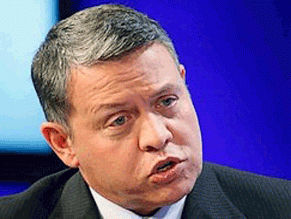|
World Jewish News

King Abdullah (photo by AP)
|
'Jordan-Israel ties at all-time low'
06.04.2010, Israel and the World Jordan’s relationship with Israel is at an all-time low since peace was established 15 years ago, Jordanian King Abdullah says in an interview with the Wall Street Journal published Monday night.
When he met with Prime Minister Binyamin Netanyahu a year ago, Abdullah told the paper, “I was extremely optimistic by the vision he had for peace between the Israelis and the Palestinians and the Israelis and the Arabs. However, I have to say that over the past 12 months, everything I've seen on the ground has made me extremely skeptical.
“There's been a lot of words, but the actions on the ground have made me extremely concerned about how straightforward Israeli policy is,” he said. “And I'm probably one of the more optimistic people you will meet in this part of the world.”
Tensions revolving around holy place in Jerusalem and the West Bank, he said, were particularly troubling, and “could ignite Muslim frustration and anger, which we do not need today.”
“Unfortunately,” Abdullah noted, “for the first time since my father made peace with Israel, our relationship with Israel is at an all bottom low. It hasn't been as bad as it is today and as tense as it is today.
“The political trust is gone, there is no real economic relationship between Jordan and Israel,” Abdullah said. “I mean, obviously there was the golden period of the wonderful relationship between my father and Prime Minister [Yitzhak] Rabin, and after the death of Rabin, again there was a resurgence with [then-prime minister Ehud Barak], but it's just been a decline since then.”
Abdullah, who flies to Washington on Saturday for an official visit, will ask US leaders to redouble peacemaking efforts in the region, especially Israeli-Palestinian peace talks.
“I think wasting too much time is something that we all have to be very concerned about because there is tremendous tension [in the region],” Abdullah said. “The status quo is not acceptable. What will happen is that we will continue to go around in circles until the conflict erupts, and there will be suffering by peoples because there will be a war.”
“There are those out there on all sides unfortunately, rejectionists … who will do everything they can to spoil the future of Israelis and the Palestinians.”
Abdullah said he was worried about Israel’s long-term future if a solution to the conflict is not found in the next few years. Israel’s standing in the international community is very low these days, he said, with the Europeans, the Russians, the Chinese and even the Americans becoming increasingly frustrated with Israeli politics.
And Israel’s real problems, he added, were from within: “The Arab-Israeli population in Israel proper, in eight to ten years, will be 50% of Israel. The Israelis have a major challenge on the future of their existence.
“Wouldn't it be better today when you're in a stronger position to make peace not only with your neighbors but with the whole Arab-Islamic world than kicking this problem down the road two or three years where your options become reduced? “
Abdullah culminated by saying Syria, which has recently seen an improvement of relations with Jordan, is interested in peace talks with Israel, but is distrustful of Netanyauh’s government.
“Yes, they are ready to talk,” he said, “but again I think everyone is still trying to decide what this Israeli government is all about. The rhetoric is positive, but actions on the ground show us something completely different, so there is frustration from Syria towards Israel.”
JPost.com
|
|
